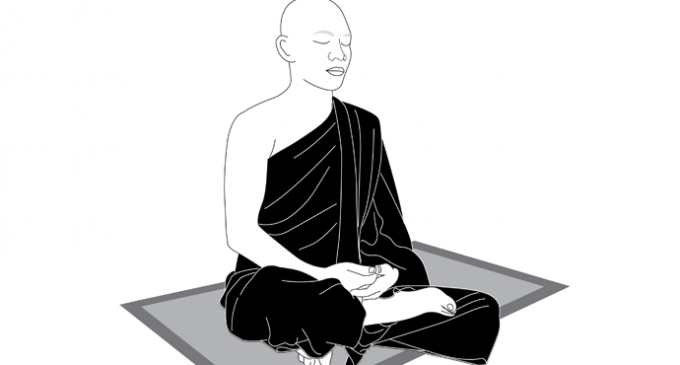THOSE FIVE MINUTES

“This thing called THIN-GAN (monk’s robes)
But itself is not a thing to be undesirable,
But worn by this bloated, stinking Khandar (Physical body)
It quickly loses its noble character,
And becomes a thing to be displeased”.
“Young monk, in our Buddhist Sasana (teaching) Thin-gan or the robe is a holy requisite for a monk, and due to age it may become worn, but it doesn’t lose its value. Well, like you dullabha monk (Myanmar youths become monks for a brief stay in the Buddhist order as a form of the rite of passage), the sons of the Buddha, if you wear the robe, it will be stained with sweat and dust; much worse is if you do not keep the rules of the monk-hood or Vinaya, that monk is the most disgusting”
Mg Doe Dauk (Mr. Straight Talker), feeling goose-bumps coming up on his skin, hastily replied:
“Yes, your Holiness”.
And he felt a little worried. Then the Thera (senior monk) asked:
“By the way, what do you do for your living in Mandalay?”
“Yes Your Holy, he works as a Tha-din-doke (correspondent)”, his mother replied for him.
“Mother, you mispronounce, Tha-din-dauk is the correct word?”
“Then you are a Htauk-hlan-yay (member of Intell-igence service)”
“Your Holy, it’s not the same, we hunt for news”
“Isn’t the same in asking people questions”
“Yes, your Holy”
“Well, just keep the rules when you are wearing the Thingan robe, then you will gain kusala (merit); if you are hungry in the evening you can have cold drinks”
“Can I have tea, your Holy?”
“If you can’t help it you can, but I don’t”
“By the way, I’ll explain the rules to be observed; there are 227 rules to be followed by a monk, but the four cardinal sins (Parajika), if committed one of them, make a monk non-monk, or that monk will be ex-communicated; a monk must not steal, must not violate the vows of celibacy and must not declare himself an Arahat (pure of kilesa-defilements) without attaining that highest state of Magga (path)”
“Yes, your Holy”
Then the old monk told him to take a rest and pointed to the place where the new monk has to spend the night during his stay in the Holy Order.
Night came and Mg Doe Dauk prayed and turned in, and he lay down gently on the bed and heard a hissing sound. What kind of snake slithered in? But to keep the rules he could not take the life of a serpent. He directed his torch-light to the place where the sound came, and alas, he found the Sayadaw meditating. It wasn’t suitable that while Sayadaw was meditating he, a novice monk, was lying snugly in bed. And he thought about a few things about meditation: keep nothing about the in-breath and out-breath, keep your mind calm and try to achieve concen-tration and try to keep your mind on the imper-manet process of the Khandar (physical body) or Vipassana as the path is known. Thus, he may gain merit for his mother, for Myanmar mothers believe that they gain merit when their sons enter the monkhood briefly. He lay down the Thin-paing (monk’s lower garment) on the bed, sat straight-back and noted the incoming and outgoing of his breath at the nostrils. But he quickly realized that he could not rein in his imagination.
“Dear, what does it mean by the word Than-yaw-zin “attachment”
“Don’t you even know that, Soe”
“Mr. Correspondent, I ask for I actually don’t know about it, i’m eager for your answer”
Attachment, in most cases, means remember-ing the loved one; to be precise when you enjoy good food, wear best clothes and feel a sense of bliss and own a beautiful house, you remember your loved one. Attachment means wanting to share these good things only, not the bad things.
“Well, then what is Metta (Love and Compassion), dear?”
“Wei Soe, honey, do you know the Venera-ble Ledi Sayadaw; the Abbot had defined Metta in this way: if you want to give five kyats to someone you must have the money, have the will and the chance to give, and without fail you must give him”
“It’s strange, dear”
“So Metta means not wanting to share bad things”
“Well then, you always busy correspondent, I want to ask you one last thing”
“Wei Soe, Miss Chatterbox, go ahead ask”
“What is love?”
“It’s easy, you can’t say it definitely; things which Metta and attachment (Than-yaw-zin) cannot render such as Vedana (feeling) can be called love”
***
“Say, Saya”
“So what, I’m busy now”
“My newspiece doesn’t come out”
“Maybe it has gone under the censor’s knife”
Mg Doe Dauk asked his editor about his piece that had gone under the censor’s scissors; he had expended much of his energy in hunting out these news: how the Chinese have gradually dominated the economic life of Mandalay, how young monks are crazy about Manchester United football club, and how the skin of young women in the old royal city become fairer and how their pronunciation of the native tongue are corrupted.
He had to follow this newslead with much vigour; he has to learn some spoken Chinese language, for they have different dialects. And for the young monks story, he had to tolerate some inconveniences at the teashop near Maha Myat-muni Pagoda where football matches are shown live on weekend days. But for the third newspiece he had to sit throughout the day and night at the internet cafes to listen through the chatting of the young fair-skinned girls.
“Doe Dauk, your brother is on the phone”
He had rented a small room, and the public phone at the corner of the street was his link to the outside world; for every tenant like him, the public phone nearby is the link to the world of internet and he was waiting for the cheapest handphone available to him.
“Elder brother, Mum is weak and thin, at night she feels itching everywhere on her whole body. The doctor says she needs nourishment, but she would not have meat or fish. The neigh-bours are asking if her elder son at town is tak-ing care of her, but she replies everytime that her son is about to open a shop in town, and that he will be earning much. And the interest is rising on the two-hundred thousand kyats loan taken out for you, my elder brother, for your plan to work in Singapore. Mum is much worried to pay up this loan. When she runs into an astrologer she always asked about your fate”
“Well, younger brother, don’t worry; I’ll write stories that will certainly pass through the censor’s scissors. If I send money this time, buy food that gives nourishment to Mum, so she’ll get back her strength”
I was abruptly awakend from my reverie by the old monk’s reminder.
“Young monk, It’s time to stop your medita-tion; I’ve been watching you for five minutes, and you’re still absorbed in your mediation. Just start with a few minutes, and then make your progress gradually. Tomorrow, you have to visit your Mum’s house to receive her ‘Soon’ rice-meal donation. Just go after early breakfast”
“Yes, your Holy”
Mg Doe Dauk hastily stopped his so-called meditation and looked at himself, his upper monk-robe was stained with sweat, and he wrung it to get rid of the sweat. The odour of the sweat was unpleasant; Why was this human body gives out such horrible odour? Is it due to the food or the weather? And he changed into a new one.
The next day he visited his home to accept the alms prepared by his mother and his younger sister. His mother wished to wash his monk’s robe as an act of merit, for she believed that her past merit was not powerful enough to enable her family to lead a well-to-do life. And thus she ardently wanted to wash his son’s holy monk robe.
But young monk Doe Dauk spoke to himself:
“The monk’s robe will be clean only if I wish it myself, Mum”
AUNG PAIK
Translated by WM
./wp-content/uploads/2018/10/Emirate-Online-TDY.png)
















There are no comments at the moment, do you want to add one?
Write a comment